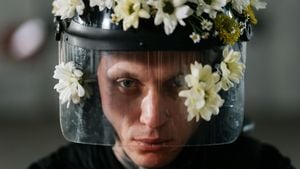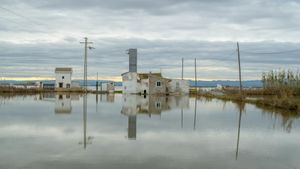When Laila Soueif began her hunger strike 56 days ago, few could have imagined the emotional intensity it would spark. The 68-year-old mother from Walthamstow, London, is not just protesting for her son, Alaa El-Fattah, but channeling her anguish and desperation over his imprisonment under Egypt's oppressive regime. Alaa, a well-known activist, has been incarcerated for his bravery, caught up in the governmental machinery suppressing dissent.
On September 30, the day many hoped would mark Alaa's freedom from his five-year sentence, marked instead the onset of Laila's protest. “I will keep going until my son is free or I’m dead,” she declares, emphasizing the urgency of her mission. Her commitment highlights not just the personal stake, but the broader issues of human rights and governmental oppression she aims to shed light on.
Meeting Laila, one might expect to find someone defeated and fragile, yet instead one finds resilience in her demeanor. She answers the door strong and defiantly, showing no signs of weakness. With long platinum hair and fierce energy, she recounted her son’s plight, which symbolizes the struggle for freedom against authoritarian rule.
“You have two possible results,” she states, dissecting the nature of her strike. “Either you succeed and you get Alaa out of jail, or you die trying.” Clearly, she feels there’s no other choice left for her. Her rallying cry becomes more poignant when noted against the backdrop of Alaa’s own sacrifices, as he has spent much of the last decade behind bars simply for voicing dreams of change for his country.
Observers note with concern the stark realities faced by any dissenters under Egyptian President Abdel Fattah el-Sisi. Those who challenge the status quo risk severe repercussions, including detention or worse. Alaa's story is not one of isolation; it resonates with countless other activists and ordinary citizens, echoing their silenced voices.
Soueif’s hunger strike isn't just about Alaa; it's about the collective struggles of families torn apart by political oppression. Her approach has garnered international attention, stirring empathy and solidarity among supporters worldwide. It's also pressed the issue of human rights violations directly onto the political stage—with loud calls for action echoing from advocacy groups and political leaders alike.
Since she first took this step, Laila has been vocal, appearing at rallies and speaking at public events. These efforts amplify the message concerning the plight of political prisoners and those fighting for democracy. Her family's history as activists—her late husband was also involved politically—adds layers to her resolve.
The backdrop of Laila’s story is particularly chilling, as reports have surfaced detailing the conditions within Egypt's prison system—overcrowded, unsanitary, and often brutal. Alaa’s detention conditions have reportedly included solitary confinement, psychological torture, and indefinite hold without clear charges. The narrative wasn’t always this dark; Alaa had hopeful plans, wanting to play his part as Egyptians rebuilt their democracy during hopes sparked by the Arab Spring. Yet, disillusionment soon followed as state suppression tightened.
Now, as Laila continues her fast, the world holds its breath. She’s made headlines, shining lights on global human rights advocacy amid rising authoritarianism across different nations. Officials and supporters alike have urged for foreign intervention and pressuring the Sisi regime to release political prisoners, starting with Alaa. Still, true action remains painfully slow.
Support from family and friends, both close and afar, continues to flow to Laila as she takes this grueling physical and emotional stand. “Some people suffer worse than this,” she acknowledges, reflecting on the broader humanitarian crises affecting many families, not just her own. “This isn’t new; it’s just the world collapsing on the heads of decent people. We can’t allow it.”
Notably, Laila’s plight hasn't gone unnoticed. Activist groups are leveraging social media to amplify her story and advocate for Alaa’s release. Public sentiment swells around the discussion of political prisoners—making it not just Laila’s fight, but one of many families across the globe.
Calls for action have begun seeping through official channels as well, with activists pushing U.K. officials and global leaders to pressure Egypt to change its brutal approach. Yet, the speed at which diplomacy works often finds it frustratingly slow—a painful reminder to Laila of the ticking clock.
Her commitment reflects another layer of emotional trauma: Laila is well aware of her own mortality. “I don’t want to die,” she admits quietly. “But I see no other way.” This painful dilemma paints the broader picture of sacrifice many families face against authoritarian rule—one of complex emotions wrapped tightly around hope and despair.
Despite being warned by friends about the toll this might take on her health, Laila remains steadfast. The physical consequences seem easier to bear compared to the thought of living her life without Alaa. “I can’t stop thinking about him, I don’t want him to suffer alone,” she states, highlighting the deep familial connection, albeit strained by distance and circumstance.
The fast continues, as does the outpour of support from the public. Each day, Laila receives messages of solidarity from individuals and organizations worldwide. They share her feelings, voicing hopes for change and recognizing the multiplicity of struggles against tyranny.
The global community watches carefully—will her hunger strike prompt the change she desperately seeks? Laila remains wrapped up not only in her own grief but also the collective sorrow of others entangled within the web of political grievances. United through Alaa's story, she's become a symbol of motherhood and courage against oppression.
For those who dare to stand up, whether on hunger strikes or protests, each act solidifies their commitment to the long fight for democracy and justice. Soueif's determination frequently serves as a rallying call, highlighting the struggles against political imprisonments and erroneous governance.
Holding on to hope, she says, “If you can’t find something worth fighting for, you might as well give up.” So she continues. The world awaits the outcome, whether it brings freedom or loss—both serve testimonies to the resolve of those fighting for justice amid adversity.
Laila Soueif’s hunger strike brings to light not just her pain but amplifies the call for change. Whether her efforts lead to swift action or prolonged struggle remains unclear. What is certain, though, is the strength found within each step she takes for Alaa. Her fight is neither solitary nor insignificant—it's woven deeply within the rising chorus of those yearning for freedom.



